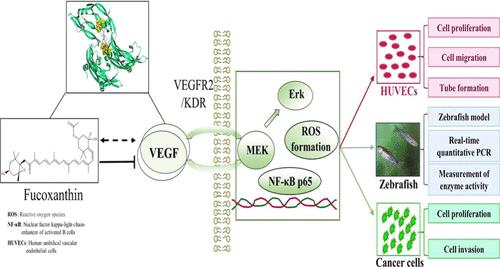当前位置:
X-MOL 学术
›
J. Agric. Food Chem.
›
论文详情
Our official English website, www.x-mol.net, welcomes your
feedback! (Note: you will need to create a separate account there.)
Fucoxanthin Attenuates Angiogenesis by Blocking the VEGFR2-Mediated Signaling Pathway through Binding the Vascular Endothelial Growth Factor
Journal of Agricultural and Food Chemistry ( IF 5.7 ) Pub Date : 2024-09-18 , DOI: 10.1021/acs.jafc.4c05464 Guo-Xia Guo 1 , Yu-Huan Qiu 1, 2 , Yang Liu 1 , Le-Le Yu 1 , Xiaoyong Zhang 1, 3 , Karl Wah-Keung Tsim 2, 3, 4 , Qi-Wei Qin 1, 2, 3 , Wei-Hui Hu 1, 2, 3
Journal of Agricultural and Food Chemistry ( IF 5.7 ) Pub Date : 2024-09-18 , DOI: 10.1021/acs.jafc.4c05464 Guo-Xia Guo 1 , Yu-Huan Qiu 1, 2 , Yang Liu 1 , Le-Le Yu 1 , Xiaoyong Zhang 1, 3 , Karl Wah-Keung Tsim 2, 3, 4 , Qi-Wei Qin 1, 2, 3 , Wei-Hui Hu 1, 2, 3
Affiliation

|
Fucoxanthin, a dietary carotenoid, is predominantly found in edible brown algae and is commonly consumed worldwide. Fucoxanthin has been shown to possess beneficial health activities such as antidiabetic, anti-inflammatory, antimutagenic, and antiobesity; however, the effects of fucoxanthin on VEGF-mediated angiogenesis and its possible binding with VEGF are unknown. Here, different lines of evidence supported the suppressive roles of fucoxanthin in VEGF-mediated angiogenesis. In human umbilical vein endothelial cells, fucoxanthin remarkedly suppressed VEGF-mediated cell proliferative, migration, and invasive abilities, as well as tube formation, without cytotoxicity. In addition, fucoxanthin inhibited the subintestinal vessel formation of zebrafish in vivo. In signaling cascades, fucoxanthin was proposed to interact with VEGF, thus attenuating VEGF’s functions in activating the VEGF receptor and its related downstream signaling, i.e., phosphorylations of MEK and Erk. Fucoxanthin also significantly blocked VEGF-triggered ROS formation. Furthermore, the outcomes of applying fucoxanthin in cancer cells were identified, which included (i) inhibiting VEGF-mediated cell proliferation and migration and (ii) inhibiting NF-κB translocation via limiting MMP2 expression. These lines of investigations supported the antiangiogenic roles of fucoxanthin, as well as reviewing its signaling mechanisms, in blocking the VEGF-triggered responses. The results would benefit the potential development of fucoxanthin for the prevention and treatment of angiogenesis-related diseases.
中文翻译:

岩藻黄质通过结合血管内皮生长因子阻断 VEGFR2 介导的信号通路,从而减弱血管生成
岩藻黄质是一种膳食类胡萝卜素,主要存在于可食用的褐藻中,在世界范围内普遍食用。岩藻黄质已被证明具有有益的健康活性,例如抗糖尿病、抗炎、抗诱变和抗肥胖;然而,岩藻黄质对 VEGF 介导的血管生成及其可能与 VEGF 结合的影响尚不清楚。在这里,不同的证据线支持岩藻黄质在 VEGF 介导的血管生成中的抑制作用。在人脐静脉内皮细胞中,岩藻黄质显着抑制 VEGF 介导的细胞增殖、迁移和侵袭能力,以及管形成,而无细胞毒性。此外,岩藻黄质在体内抑制斑马鱼的肠下血管形成。在信号级联反应中,岩藻黄质被认为与 VEGF 相互作用,从而减弱 VEGF 在激活 VEGF 受体及其相关下游信号传导(即 MEK 和 Erk 磷酸化)中的功能。岩藻黄质还显着阻断了 VEGF 触发的 ROS 形成。此外,确定了在癌细胞中应用岩藻黄质的结果,其中包括 (i) 抑制 VEGF 介导的细胞增殖和迁移和 (ii) 通过限制 MMP2 表达抑制 NF-κB 易位。这些研究支持岩藻黄质的抗血管生成作用,并回顾了其信号传导机制,在阻断 VEGF 触发的反应中。研究结果将有利于岩藻黄质预防和治疗血管生成相关疾病的潜在开发。
更新日期:2024-09-18
中文翻译:

岩藻黄质通过结合血管内皮生长因子阻断 VEGFR2 介导的信号通路,从而减弱血管生成
岩藻黄质是一种膳食类胡萝卜素,主要存在于可食用的褐藻中,在世界范围内普遍食用。岩藻黄质已被证明具有有益的健康活性,例如抗糖尿病、抗炎、抗诱变和抗肥胖;然而,岩藻黄质对 VEGF 介导的血管生成及其可能与 VEGF 结合的影响尚不清楚。在这里,不同的证据线支持岩藻黄质在 VEGF 介导的血管生成中的抑制作用。在人脐静脉内皮细胞中,岩藻黄质显着抑制 VEGF 介导的细胞增殖、迁移和侵袭能力,以及管形成,而无细胞毒性。此外,岩藻黄质在体内抑制斑马鱼的肠下血管形成。在信号级联反应中,岩藻黄质被认为与 VEGF 相互作用,从而减弱 VEGF 在激活 VEGF 受体及其相关下游信号传导(即 MEK 和 Erk 磷酸化)中的功能。岩藻黄质还显着阻断了 VEGF 触发的 ROS 形成。此外,确定了在癌细胞中应用岩藻黄质的结果,其中包括 (i) 抑制 VEGF 介导的细胞增殖和迁移和 (ii) 通过限制 MMP2 表达抑制 NF-κB 易位。这些研究支持岩藻黄质的抗血管生成作用,并回顾了其信号传导机制,在阻断 VEGF 触发的反应中。研究结果将有利于岩藻黄质预防和治疗血管生成相关疾病的潜在开发。































 京公网安备 11010802027423号
京公网安备 11010802027423号